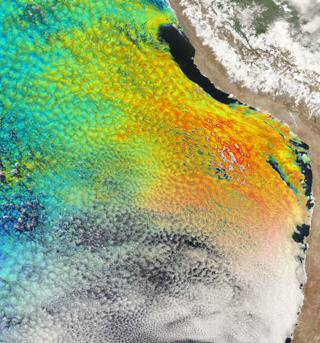Until now, scientists who study air pollution using satellite imagery have been limited by weather. Clouds, in particular, provide much less information than a sunny day.
University of Iowa scientists have created a technique to help satellites "see" through the clouds and better estimate the concentration of pollutants, such as soot. The finding is important, because, like GPS systems, clouds block remote-sensing satellites' ability to detect, and thus calculate, the concentration of pollution nearer to the ground. This includes particles (commonly known as soot) that reduce air quality and affect weather and climate.
The results of the study are published July 9 in the online early edition of the journal Proceedings of the National Academy of Sciences (PNAS).

“Particles in the atmosphere (aerosols) interact with clouds changing their properties. With this technique, we can use remote sensing observations from satellites to estimate these cloud properties in order to correct predictions of particle concentrations. This is possible due to a numerical model that describes these aerosol-clouds interactions,” says Pablo Saide, environmental engineering doctoral student and researcher at the UI Center for Global and Regional Research (CGRER).
Scott Spak, co-author and assistant professor of civil and environmental engineering in the UI College of Engineering, adds that the new technique is expected to find immediate application across a wide range of activities. Examples include air quality forecasting, numerical weather prediction, climate projections, oceanic and anthropogenic emissions estimation, and health effects studies.
But the ability to see pollution “through the clouds” is also expected to have “on the ground” health results.
“Unlike previous methods, this technique can directly improve predictions of near-surface, fine-mode aerosols—such as coal-fired electric generating plants and wood-fueled cooking fires—responsible for human health impacts and low-cloud radiative forcing (solar heating),” says Greg Carmichael, co-author, professor of chemical and biochemical engineering, and CGRER co-director. "This technique is also complementary to previous methods used, allowing the observing system to ‘see aerosols’ even under cloudy conditions.”
Here’s how the technique works:
- Existing weather satellites observe warm, single-layer clouds, such as the stratocumulus clouds that form off the west coasts of Africa, North America, and South America. These clouds are thought to be the main factors contributing to climate cooling.
- Researchers calculate the number of droplets in the clouds using the satellite data, which are compared to a model estimate provided by the UI program.
- As airborne particles interact with clouds changing their properties, model estimates of particles are corrected so that the model will generate a better agreement with the satellite number of droplets.
- Particles interacting with clouds are usually below clouds, thus, in some cases, the model corrections can be attributed to manmade emissions.
The researchers conducted their study using National Science Foundation (NSF) aircraft measurements to make simultaneous cloud and particle observations, which verified satellite observations and the mathematical formulas used to determine the pollution concentrations in the air.
All three UI researchers agree that their new technique for seeing through clouds to make ground observations is likely to generate growing interest as the need to infer ground air pollution levels, and the need to mitigate the human hazards posed, grows larger.
In addition to UI researchers, paper co-authors include Patrick Minnis of NASA Langley Research Center, Hampton, Va., and Kirk Ayers of Science Systems and Applications Inc., Hampton, Va.
The PNAS article is titled “Improving aerosol distributions below clouds by assimilating satellite-retrieved cloud droplet number.”
The research was funded by NSF and NASA.